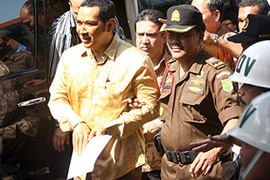Obituary: Suharto
Indonesia’s former president ruled with an iron fist for more than 30 years.

 |
| Suharto was accused of embezzling billions of dollars while he was president [EPA] |
As president of the world’s most-populous Muslim nation, Suharto ruled Indonesia with an iron fist for more than three decades.
He was born in 1921 on the island of Java and began his military career in the colonial Royal Netherlands East Indies Army, but went on to serve in the Indonesian National Revolution in the guerrilla war against the Dutch that led to independence.
The “smiling general” replaced Sukarno, the country’s first president, in 1967, two years after an alleged coup attempt that saw the murders of six high-ranking generals and one lieutenant.
Sukarno’s bodyguards said that the seven officers were killed because they were involved in a CIA-backed plot, but Suharto blamed Sukarno’s allies and increasingly powerful Indonesian communist party.
Suharto then used the resulting confusion to improve his position and eventually take control.
Suharto won the support of Washington for his anti-communist stance but became notorious for allegedly ordering one of the worst mass murders of the 20th century.
| Suharto timeline | ||
1950s – Suharto rises quickly in ranks of post-independence Indonesian military, helping to crush several rebellions 1965-67 – Escaped an attempted coup and manipulated the resulting confusion to become Indonesia’s second president 1970s-1980s – Pro-western modernisation drive brings sustained economic growth, but also widespread corruption 1997 – Asian financial crisis plunges Indonesia into financial chaos, triggering months of internal unrest and mass demonstrations 1998 – Continued economic turmoil forces Suahrto to announce his resignation 2007 – Prosecutors sue Suharto for $1.4bn over alleged misuse of funds from a charity he chaired while in office |
Under his leadership, the government allegedly authorised the murder and deportation of hundreds of thousands of individuals perceived to be communist sympathisers.
In the first few months alone of his rule, about half a million people were believed to have been killed or deported.
A few years later, Suharto ordered the invasion and annexation of the former Portuguese colony of East Timor – an operation that resulted in the death of more than 100,000 East Timorese, or about one tenth of the population.
Fear and admiration
But while Suharto’s strong arm tactics aroused widespread fear, many Indonesians admired him for overseeing the country’s modernisation and raising living standards during the 1970s and 1980s.
He opened the country to foreign investors which led to an economic boom, as well as fuelling endemic corruption.
But the Indonesian economy was also his downfall, when the 1997 Asian financial crisis unravelled many of his improvements and protests brought his three decades of rule to an end.
Suharto was forced to stand down in 1998 as pro-democracy movements gathered momentum and his support from Indonesia‘s military and political institutions began to diminish.
Transparency International, an anti-corruption watchdog, has accused Suharto of being one of the century’s most corrupt leaders, amassing billions of dollars for himself, his family and associates while in power.
Two years after his fall, prosecutors filed charges against the former president accusing him of embezzling $600 million in public funds, but legal proceedings were suspended because of his poor health.
Prosecutors also brought a series of cases against Suharto’s youngest son, Hutomo Mandala Putra, commonly known as Tommy, who was sentenced to 15 years in jail for ordering the killing of a a senior judge who had convicted him of corruption.
However, his sentence was later reduced and he was released in 2006 after serving only four years in jail – a move many Indonesians said was solely because of the family’s continued wealth and power.
Suharto and members of his family have denied all the allegations of corruption levelled at them.
In recent years Suharto himself had been in and out of hospital for various illnesses, suffering from at least two strokes and recurring bouts of intestinal bleeding.
Libel win
 |
| Suharto’s youngest son Tommy was jailed for ordering the killing of a judge [EPA] |
He is also said to have suffered permanent brain damage and some loss of speech due to his ailments.
But despite the criminal trial being abandoned a civil suit was under way against the so-called “King of Thieves”.
Prosecutors sought to claim $1.4 billion in damages and returned assets allegedly accrued by Suharto through a charitable foundation he chaired whilst in power.
Meanwhile Suharto was claiming victory after Indonesia‘s supreme court last year ordered Time magazine to pay him more than $100m in damages in a libel suit.
Time, which has challenged the ruling, published a story in May 1999 saying that the former president and his family had stolen around $15bn in state funds.
In a rare interview with Indonesia‘s Gatra news magazine after the verdict, Suharto vowed to donate the damages to Indonesia‘s poor.
He said his critics “can say what they want … the fact is I’ve never committed corruption”.
